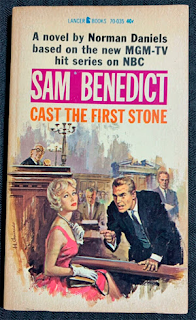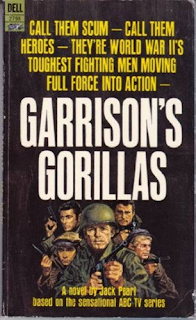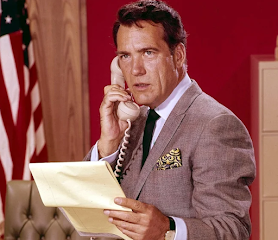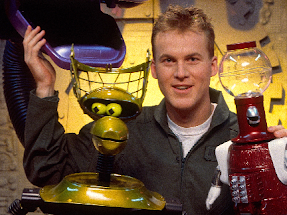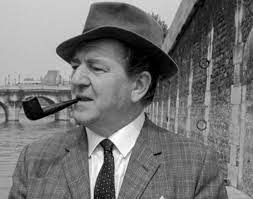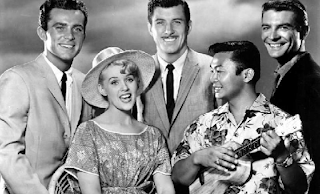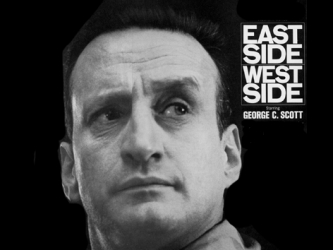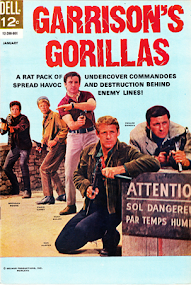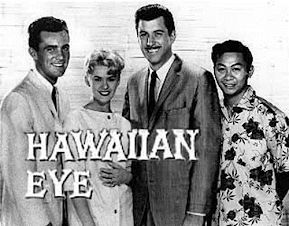|
Shows I’ve Watched: | Shows Next on the List: |
East Side/West Side (abandoned) | Judd for the Defense |
Garrison's Gorillas Hawaiian Eye The Baron | The Felony Squad The Man Who Never Was Tightrope! |
|
|
I haven't done one of these lately, for the simple reason that I haven't introduced any new programs to the weekly rotation for awhile. That's all changed now; it seems as if a good half of the schedule has rolled over in the last few weeks. Talk about the new spring season! We've got new shows on the docket for tryouts, which makes this both the best of times and the worst of times.
And we'll start with one of the latter. Pretty much the entire run of East Side/West Side is available on YouTube, and since it has such a strong reputation, we thought it was worth a look. I can't remember if it was three or four episodes that we made it through, but suffice it to say that it's not quite the right show to introduce when one is in the midst of living through these fairly depressing times. East Side, which stars George C. Scott as dedicated New York social worker Neil Brock, is known as one of the grittiest, most unvarnished dramas ever to air on American television. It also has the reputation of being one of the grimmest, most depressing dramas ever to air. I had no problem accepting the brilliance of Scott's performance, as he's always been a favorite of mine.
Perhaps it was that I wasn't in the mood for the show's bleeding-heart liberalism, which fairly gushes from the carotid artery of each storyline, but I think there's more to it than that. The glory years of
Doctor Who, for example (especially the Jon Pertwee seasons), were known for pushing a liberal agenda, but much of the time it was done through allegory rather than outright political preaching, and Sunday morning preaching (minus the religion) is exactly what one gets with
East Side. Not just preaching, but
shrill preaching, at one hundred miles an hour, with nary a moment for subtleties or nuances.
The last episode we watched, "I Before E Except After C," is a particular example. It involved the effect of delinquent students on the education system, and while it had a strong supporting cast, including William Daniels as a harried principal and Howard Da Silva as an idealistic teacher, and pretty much telegraphed its ending in the first few minutes. It was achingly earnest, with characters delivering speeches instead of dialog, and while it did deal with an important topic, it did so in such a one-sided manner that I wound up rooting for the police to throw the whole bunch of brats into the cooler and throw away the keys. I know we're supposed to look at the bright side of things, but this left me watching through morose-colored glasses.
Why, I wondered, did this show end after only one season? Most people say it was because of the controversial topics discussed, but were they any more controversial than those debated on The Defenders, CBS's other controversial issues-driven show? I think not; Neil Brock may have felt the system was against him, but Lawrence and Kenneth Preston, the father-son team of defenders (played by E.G. Marshall and Robert Reed), were basically likable people, played by likable actors. Agree with them or not, they were doing their best on behalf of their clients, and it's hard to argue with that. George C. Scott, on the other hand, is often not a likable person—either personally or as Brock—and he often left me wanting to punch him in the nose. (Although, it should be noted, Cicely Tyson plays the department's administrative person, and in real life Scott fought hard to keep her in the role, despite opposition by the network and some southern affiliates. Better things were ahead for her.) I neither liked nor particularly admired East Side/West Side, but a lot of people feel otherwise, so perhaps it's just me. I don't feel inclined to revisit it, though.
East Side/West Side was replaced in the lineup by an action-adventure series from the late 1960s,
Garrison's Gorillas, which aired on ABC. If you've seen
The Dirty Dozen, then you'll get the premise of
Garison's Gorillas quickly: Lieutenant Garrison (Ron Harper) is put in charge of a motley group of hardened criminals (Cesare Danova, Brendon Boone, Christopher Cary and Rudy Solari), each with a particular talent or skill that qualifies them to become part of a commando unit assigned to carry out impossible missions, from freeing resistance leaders to reuniting a scientist with the baby he left behind when he defected to the Allies.
The key difference with the movie should be readily apparent: whereas Lee Marvin's cons were selected to carry out one vital mission, Garrison's gorillas are tasked with a different assignment each week, though it's not clear from the first episode that they were made aware of this when they were chosen (their relief at completing their initial mission is doused when Garrison tells them that was just the first one, and they're in this "for the duration [of the war] plus six months."
The complex plans that the unit needs to carry out to bring off each assignment, and the many obstacles they have to overcome during the execution of those plans, makes me think of Garrison's Gorillas as "Hogan's Heroes if it were a drama," with a dash of "Mission: Impossible if it were a comedy." Their assignments rival those of Hogan's team in their audacity and level of risk, without the punchlines and inept Germans. (One suspects the gorillas are given these assignments because they're considered expendable in case anything goes wrong.) And things do go wrong, often; unlike the M:I agents, these cons are not a well-trained group of agents, and the plans seldom ever unfold the way they were intended.
Garrison's Gorillas is not great drama. It certainly lacks the grit of ABC's great war drama Combat!, and, as Cleveland Amory once wrote, it's "ludicrously one-sided, a second-hand idea, and third degree violence." However, Amory added, "it's a first-rate show." I find that difficult to argue with. The byplay between the team members increases in each episode; a particularly illuminating one is "The Grab," where they're tasked to kidnap a defecting scientist's baby whom the Nazis are holding as hostage. When they arrive at the snatch point, they discover not one, but three babies, and with no way of telling which one belongs to the scientist, they take all three. Their efforts to escape the country include two of them dressing in drag, posing as the babies' mothers: grumble as they might, it's apparent that they all become increasingly attached to the tykes—perhaps it's reviving the humanity they lacked in prison.
Garrison and his men were together for only one season, but one can think that if they do, in fact, make it to the end of the war, they'll have become different men, and Garrison will probably have advanced a rank or two. Whether or not that means his team will avoid winding up back in prison is another question.
Speaking of criminals, we've spent the last few years working our way through the collection of Warner Bros. detective series that populated the airwaves in the late 1950s and early 1960s. It's true that they're cookie-cutter, formulaic shows, featuring some combination of: two (or three) young and handsome detectives; a girl singer or house band (creating just enough song rights issues to prevent them from being issued on DVD), a sidekick to provide comic relief; a catchy theme (all by Mack David and Jerry Livingston); an exotic location; plots that are, for the most part, interchangeable between shows; and an alliterative title. So far, we've completed
Bourbon Street Beat and
The Roaring '20s*, we're almost done with
77 Sunset Strip, and we've yet to begin
Surfside 6. If you're keeping score at home, you know where that leaves us:
Hawaiian Eye.
*Yes, I know The Roaring '20s doesn't quite count, but back then newspaper reporters were kind of like detectives, weren't they?
Hawaiian Eye, like Bourbon Street Beat, debuted in the fall of 1959; unlike BSB, it ran for four successful seasons, second only to Sunset Strip in duration. (In fact, Sunset Strip's Stu Bailey makes an appearance in Hawaiian Eye's first episode.) Our handsome detectives are Anthony Eisley and Robert Conrad, the musical interludes are provided by a painfully young and adorable Connie Stevens, and the comic foil is Poncie Ponce. Just about the only thing missing is the alliteration, but I'm not quite sure what they could have done with that. (Honolulu Heavies? Hawaiian Hijinks? Pineapple State Protectors?)
This show is no more and no less than any of the other WB detective beats, but if you didn't already know that you wouldn't be watching it. It's fun and entertaining, the mysteries keep you engaged without making your brain hurt, and the leads deliver. Although it's the second-longest of the WB shows, it's not quite as good as Sunset Strip; Eisley is just a tad too stiff and Conrad hasn't quite grown into Jim West yet, and they both treat Connie Stevens more like a little sister than any kind of romantic interest (they'll be sorry!)—but, again, if this really bums you out, you're probably in the wrong place to begin with. One noticeable difference between Eye and the others is that, instead of alternating leads, both Eisely and Conrad tend to appear in each episode, although one is usually featured more than the other. Whether or not this continues, we'll see.
What does all this prove? That I prefer easy, non-threatening, action programs to gritty, hard-hitting dramas that ask the tough questions? Maybe that's true for the moment, but I don't think you can say that in general. I've said many times that watching television should be enjoyable, even fun; if I'd stuck with East Side/West Side, I would have been hate-watching it every week. Perhaps I just prefer to save the preaching for Sunday morning. Maybe I'm tired of having anti-heroes as leads. Television needed, and grew, with intelligent programs and literate writing. As I've said before, you can't survive on a diet of nothing but dessert. But sometimes a hot-fudge sundae just hits the spot. TV


















